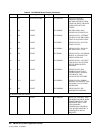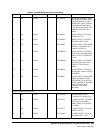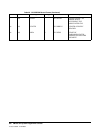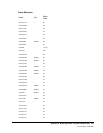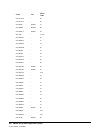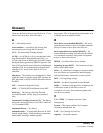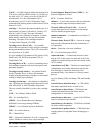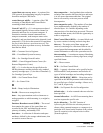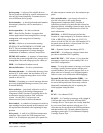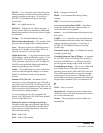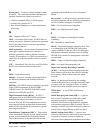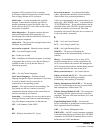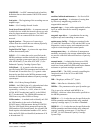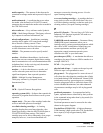
1st ed., 6/30/04 - 312579601
656 VM/HSC 6.0 System Programmer’s Guide
CAPid— A CAPid uniquely defines the location of a
CAP by the LSM on which it resides. A CAPid is of
the form AA:LL:CC where AA is the ACSid (00-FF
hexadecimal), LL is the LSM number (00-17
hexadecimal), and CC is the CAP number. Some
commands and utilities permit an abbreviated CAPid
format of AA:LL.
cartridge— The plastic housing around the tape. It is
approximately 4 inches (100 mm) by 5 inches (125
mm) by 1 inch (25 mm). The tape is threaded
automatically when loaded in a transport. A plastic
leader block is attached to the tape for automatic
threading. The spine of the cartridge contains a
Tri-Optic label listing the VOLSER.
Cartridge Access Port (CAP)— An assembly
which allows an operator to enter and eject cartridges
during automated operations. The CAP is located on
the access door of an LSM.
See also standard CAP, enhanced CAP, priority CAP,
WolfCreek CAP, WolfCreek optional CAP, or
TimberWolf CAP.
Cartridge Drive (CD)— A device containing two or
four cartridge transports with associated power and
pneumatic supplies.
Cartridge Scratch Loader— An optional feature
for the Cartridge Drive. It allows the automatic
loading of premounted tape cartridges or the manual
loading of single tape cartridges.
cartridge system tape— Also known as a Standard
tape. The basic tape cartridge media that can be used
with 4480, 4490, or 9490 Cartridge Subsystems.
They are visually identified by a one-color cartridge
case.
CAW— See Channel Address Word.
CD— See Cartridge Drive.
CDRM— Cross Domain Resource Manager
definition (if not using existing CDRMs).
CDRSC— Cross Domain Resource definition.
CDS— See control data set.
CE— Channel End.
CEL— Customer Emulation Lab. cell. A storage slot
in the LSM that is used to store a tape cartridge.
Central Support Remote Center (CSRC)— See
Remote Diagnostics Center.
CFT— Customer Field Test.
channel— A device that connects the host and main
storage with the input and output control units.
Channel Address Word (CAW)— An area in
storage that specifies the location in main storage
where a channel program begins.
channel command— A command received by a CU
from a channel.
Channel Status Word (CSW)— An area in storage
that provides information about the termination of
I/O operations.
check— Detection of an error condition.
CI— Converter/Interpreter (JES3).
connected mode— A relationship between a host
and an ACS. In this mode, the host and an ACS are
capable of communicating (at least one station to this
ACS is online).
control data set (CDS)— The data set containing all
configuration and volume information used by the
host software to control the functions of the
automated library. Also known as a library control
data set.
See also Primary CDS, Secondary CDS, and Standby
CDS.
control data set allocation map— A CDS subfile
that marks individual blocks as used or free.
control data set data blocks— CDS blocks that
contain information about the library and its
configuration or environment.
control data set directory— A part of the CDS that
maps its subdivision into subfiles.
control data set free blocks— CDS blocks available
for future subfile expansion.
control data set pointer blocks— CDS blocks that
contain pointers to map data blocks belonging to a
subfile.



